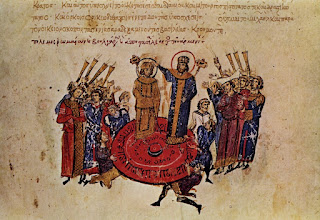Alexios of the Comnenos dynasty (1182 - 1222) and his brother David led an expedition into the area with the help of Queen Tamar of Georgia (mother of George IV and Rusudan). Alexios set himself up as Alexios I Megas Comnenos ("Great Comnenos"). The connection between Alexios and Tamar has puzzled scholars. Alexios and David were supposedly being raised at Tamar's court. A 14th-century Trebizond chronicler referred to Tamar as Alexios' "paternal relative," but that made nothing clear; how she may have been related to Alexios' father is a complete mystery.
Although the two brothers were part of the royal family, they knew they would never be close to the throne. Creating their own kingdom was one way to improve their situation. Why Queen Tamar was willing to help them with troops is unknown. Perhaps she felt having allies in Trebizond would be a helpful buffer state on one side of Georgia.
Situated around the coastline of the Black Sea (the green areas in the illustration), Trebizond started as a prominent Greek colony that mined silver and copper. It was sufficiently distant from Rome and Constantinople that it was not affected by their politics, and developed its own government.
The rulers of Trebizond claimed to be the proper Roman emperors after Constantinople was taken by the Crusaders. That lasted until 1261, when Michael VIII Paleologos recaptured the area and asserted his authority. Michael also brought Trebizond "closer" to its "parent" empire by marrying one of his daughters, Eudokia Paleologina, to John II of Trebizond, a grandson of Alexios I. John II was the ruler when David Narin of Western Georgia tried unsuccessfully to join Trebizond to his part of Georgia.
Despite constant assaults from all around, Trebizond existed as largely independent until 1461, as well as civil strife. I'll relate some of those conflicts tomorrow.



